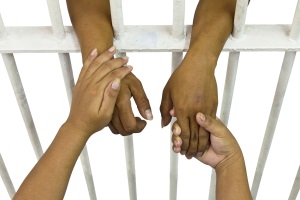When men and women who have been convicted of a crime are incarcerated, the sentence almost always extends beyond the prisoner. Spouses, parents, and children all “serve time” with their loved ones behind bars, suffering silently as they pay the price together for past misdeeds.
In an article for the Marshall Project, the wife of a recently sentenced husband writes anonymously about preparing for his eminent departure for the Federal Correction Facility in Florence, Colorado. “I can’t believe you’re going to Florence without me,” the author says, joking about the couple’s long-held desire to visit Italy together.
 But while the one spends the six weeks between sentencing and incarceration getting ready to move two-and-a-half hours away to live in a prison cell, both husband and wife are preparing for a life apart, and the changes that would be required of them.
But while the one spends the six weeks between sentencing and incarceration getting ready to move two-and-a-half hours away to live in a prison cell, both husband and wife are preparing for a life apart, and the changes that would be required of them.
The author recounts pulling up to the gate of the facility. As her husband exited the car, she was told, politely but firmly, that she could not stay. “You need to pull the car around and leave,” she was instructed by the guard on duty.
“I turned the car and pulled out to the gate, stopping on the side of the highway,” she says. “I looked back to see him standing there in jeans and a black t-shirt. He waved and gave me a thumbs up. I drove home to my empty house, the new “for sale” sign up on the front lawn.”
Families and loved ones of men and women behind bars are forgotten victims of crime. While not incarcerated themselves, they too suffer from the separation. In some cases, a parent is lost, leaving young children to cope without a mom or a dad (or both). Often, there is a loss of income, resulting in financial hardship for the family that remains. And there’s always the stigma attached to having a family member in prison.
Prison Fellowship’s Angel Tree program seeks to build and maintain relationships separated by crime and incarceration. By developing and encouraging ongoing interaction between prisoners and family, recidivism rates are drastically reduced for the men and women behind bars, and the children of those prisoners are less likely to follow their parents’ path into crime. Angel Tree helps to provide families of prisoners with the physical, emotional, and spiritual support they need during their loved one’s incarceration.
Angel Tree is currently seeking churches and groups who are interested in participating in this year’s Angel Tree Christmas program. By providing gifts to boys and girls on behalf of their incarcerated parents, you can help restore broken families and display God’s love to children in your community. To learn more about Angel Tree and how you can be a part of it, visit www.angeltree.org.